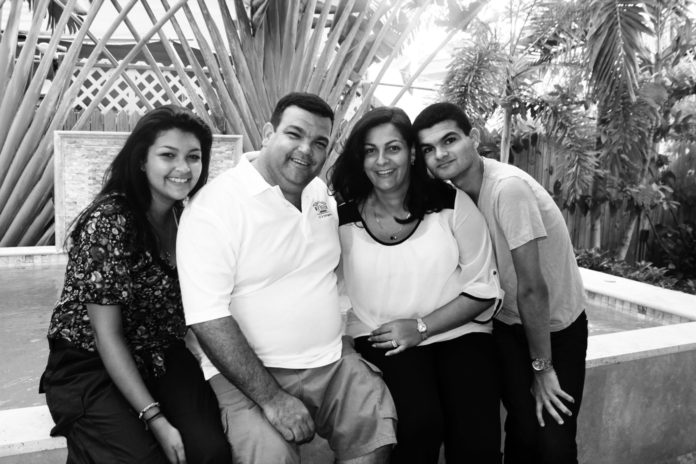This time last year I was living in San Diego. The crossing between that city and Tijuana, Mexico is the busiest land-border crossing in the world. The region is also the focus of a shrill debate about immigration.
Despite the acrimony around that debate Mexican migration isn’t the only refugee narrative that has animated this country in recent years. Now that I live in Florida it is clear that people fleeing Cuba’s increasingly dire brand of communism provide an equally compelling storyline — one that isn’t heard as often or as angrily on a national stage.
While the circumstances that cause Cubans, Mexicans and others to leave their home countries and seek refuge in the United States might be different, each journey is marked by desperation, courage and hope. And, for those individuals who make it, their journey becomes an origin story for a new American family.
One such story belongs to Frank Herrada. The year was 1993.
I met with Herrada at the Banana Café. He is a robust guy, good-natured and a great storyteller. As soon as we sat down, he painted a vivid picture with just a few words and gestures of the Cuba his family fled. Quite suddenly he lowered his voice, leaned across the table and whispered that back in Cuba he would not be able to discuss his thoughts and opinions out in the open like this.
“Everything was controlled,” he told me. “Everyone was watching and listening.”
Herrada acknowledged the diners sitting around us. “Back in Cuba,” he said, “everyone at every table around us would take information and offer it to the authorities in return for a favors or special treatment. We all lived in fear.”
Herrada’s own mother was an avid communist. But that changed when a son was born with medical issues. While quality medical care existed in Cuba, it wasn’t available to everyone. So, despite her strong political convictions, Herrada’s mother made the fateful decision to join a group of 17 other family members including a month-old baby on a risky voyage to America.
Herrada was 17 at the time and he wasn’t going to join his family because he was in love with a girl. But fate intervened, as it often does with stories like this. Just before the family’s departure date the girl left him for someone else. Herrada thought he had nothing to lose and left Cuba too.
For the most part Herrada speaks plainly about his experience. But, in a surprisingly poetic moment of recollection he stops, looks into the near distance and describes the view as the boat carrying his family pulled away from the Cuban shore and into the night.
“There was a full moon that night. Our boat was headed north. I watched as the light of the Cuban coastline disappeared.”
Each voyage from Cuba to the U.S. is different. Some vessels are intercepted and the passengers are returned home to Cuba. Some ships are not fit for sailing and they and their passengers are lost at sea. Others reach the shore and, once a foot is set onto dry land, the refugee is eligible for U.S. residency and then citizenship. Frank Herrada’s journey to America was prior to this current “wet foot, dry foot” policy. His family’s voyage lasted a month.
Why? Well, to make a long story short it boils down to this: they ran out of gas. The ship then drifted and finally landed on a remote island in the Bahamian chain where they lived off snail and turtle meat. The family languished on that beach, until they were rescued by a passing ship and taken to Nassau. There they were taken in by a stranger and offered asylum in the Bahamas. But Frank Herrada’s stepfather declined the offer, and the family continued on to America.
When the family finally reached the U.S., the odyssey continued as each refugee assimilated into the melting pot that is America. Along with some others in the group, Frank found himself in Key West where he has remained.
The love struck Cuban teenager whose life might have followed an entirely different route married his high school sweetheart, Mercy, and the couple have two children, Francisco (Frankie Jr.) and Mercedes.
“He could barely speak a word of English and the first thing he ever said to me was, ‘You are going to be my wife,’” said Mercy Herrada with a bright smile. “I had a boyfriend at the time and he said it right in front of him. But that’s Frank. He always knows what he wants and he goes after it.”
Herrada didn’t stop there. Working from dusk until dawn, he learned the construction business while rising through the ranks of Historic Tour of America. At the same time, he was studying for his contractor’s license. Today, Herrada boasts more than five licenses (contractor, home inspector, AC, plumbing, roofing and renovator) but clearly there is time enough to accomplish a whole lot more.
As we left the Banana Café Herrada turned back to the restaurant, on the corner of Duval. He asked me if I knew Pepe’s over near the waterfront. I said I did. “Pepe’s was once located here,” he told me. “Where the Banana Café is now. My very first job was cleaning dishes at Pepe’s.”
That was then; just look at him now.


























